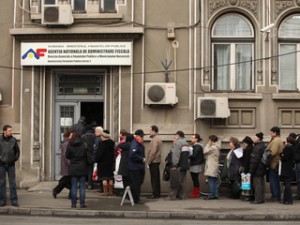 Bulgarian tax authorities, which have successfully implemented a modernization program with World Bank’s support, a program that Romania abandoned after six years of delays and extensions, have clearly superior results to our domestic tax authority in terms of increasing the collection rate.
Bulgarian tax authorities, which have successfully implemented a modernization program with World Bank’s support, a program that Romania abandoned after six years of delays and extensions, have clearly superior results to our domestic tax authority in terms of increasing the collection rate.
As a share of GDP, Bulgaria collects higher tax revenues to the budget, while VAT GAP, namely the difference between the revenue a state could collect and the actual amounts collected, is significantly lower and even significantly declining, as the neighbouring state ranks first in Europe in terms of adjusting this indicator.
The most recent analysis of the European Commission shows that Bulgaria’s VAT GAP in 2016 was only 14%, down by eight percentage points compared to 2015 and ten points lower than in 2014.
Romania, on the other hand, recorded a VAT GAP of 36% in 2016, the highest in the EU and on an increasing trend compared to 2015 (34%). Romania leads in Europe by unpaid taxes, while Bulgaria is the European leader in terms of the progress made in reducing these gaps.
According to the Commission’s estimates, Romania’s state budget is deprived by about six billion euros annually due to the VAT GAP, the causes of which are both tax evasion and the inefficiency of the tax administration.
If Romania improved collection and even reached Bulgaria’s level, the state would have money for a motorway every year, according to the calculations of Fiscal Council’s chairman Ionut Dumitru.
„If we had a collection rate like Bulgaria, we would have extra budget revenues of EUR 3.8 billion. It is colossal in terms of the impact dimension. If we could collect VAT as in Bulgaria, we could build a highway like Comarnic-Brasov every year, ” Dumitru explained at a conference late last year.
Bulgaria, tax revenues exceeding level programmed. Romania – at a historical minimum level
Figures for budget execution in 2018 also indicate a higher efficiency of the Bulgarian tax administration.
In the first 11 months of 2018, Bulgaria’s tax authorities have collected over EUR 11 billion to the budget, which exceeded their target by 3.6%, according to the latest data released by the Bulgarian Ministry of Finance.
Romania, on the contrary, collected last year tax revenues of about EUR 30.6 billion, in the context in which VAT revenues were by RON 1.7 billion lower than the level from the budget law. The Government did not reach its target either on the excise section, where the failure was similar, with RON 1.7 billion.
Tax revenues are the most important source of financing for the public budget, followed by the revenues from insurance contributions. European methodology means by tax revenues (tax to GDP) both tax revenue and social security contributions collected by the state.
In 2017, revenues from taxes and contributions collected by the neighbouring state amounted to 29.5% of GDP, by 3.7 percentage points more than the level recorded by Romania, according to the latest Eurostat data.
In 2018, these revenues continued to decline in Romania, to just over 25% of GDP, the historical minimum.
That is the context in which, in terms of tax rates, Bulgaria has an income tax of 10%, a corporate tax of 10%, 6pp lower than Romania, and VAT of 20%, one percentage point above Romania (some exceptions exist: 9% for bakery products, 5% for HoReCa, etc.).
Of what Bulgarian reform consisted
Bulgaria has made a first tax reform in 2003-2009, with the World Bank’s help, which provided total funding of about USD 63 million, according to information available on the website of the international institution.
The “Program for revenue reform and administration” has supported the integration of tax and insurance contributions collection (pensions, health services and others) to improve the effectiveness and efficiency of Bulgaria’s revenue collection system and facilitate the development of the private sector. „Improvements in revenue management and sustainable economic growth have helped to increase tax revenues and contributions by 4.6 percentage points of GDP between 2002 and 2008,” conclusions following the implementation of the project indicate.
Bulgarian authorities continued to carry out programs to improve collection. Such a program was also carried out between 2015-2017, with the aim of increasing the budget revenues by reducing the grey economy and the compliance costs, according to the Bulgarian Ministry of Finance.
The project that Romania threw away
Romania, on the other hand, decided in November 2018, after 6 years since it signed the agreement, to abandon a similar project with the World Bank.
The ANAF reform was approved in 2013, but the project started very hard. The first alarm signals were drawn by the financial institution in 2015. In 2016, the World Bank decided to extend the project by two years – initially scheduled to end in May 2019 – after finding a lack of political will towards reforming the tax authority.
Sources close to the talks with the World Bank have stated for cursdeguvernare.ro that the Finance Ministry notified the financial institution in November 2018 that it does not want to complete the reform project in ANAF.
Consequently, the Finance Ministry has assumed to abandon EUR 52 million (the amount that could further be obtained in the project), to reimburse EUR 18 million (the amount spent so far) and assume the poor digital infrastructure.
Moreover, recently, the Government decided to resume to the old structure of a tax administration divided by counties, in the context that a precondition of the agreement with the World Bank was the restructuring of the tax authority on regional centres.









